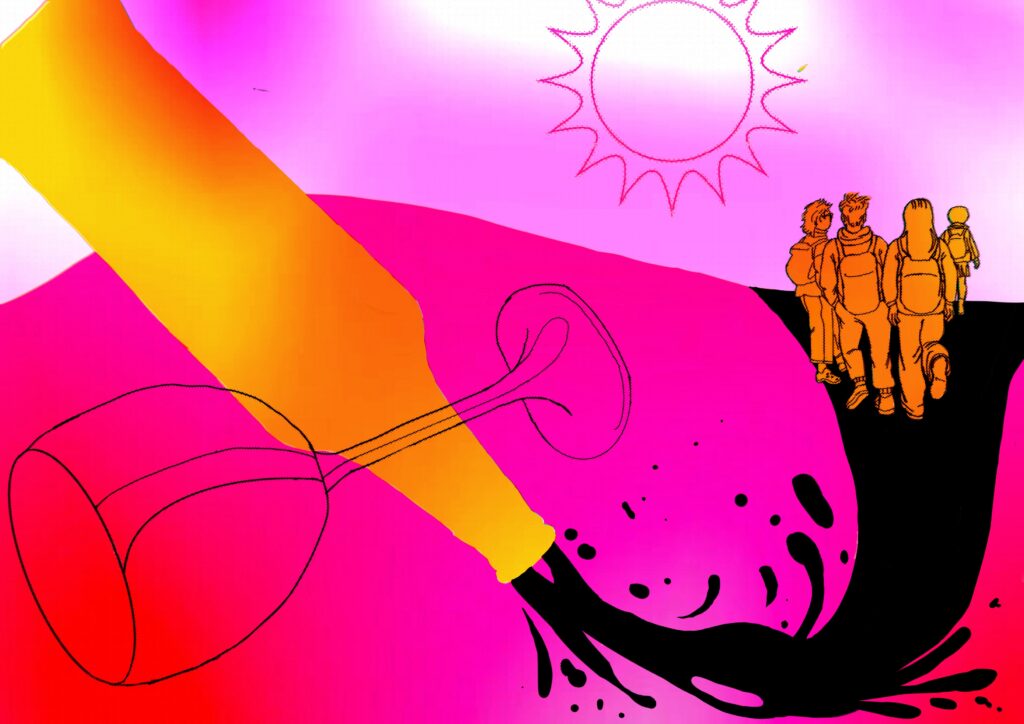Featured illustration: Georgia Harmey
Dreaded by the hospitality industry and controversial across Britain, the Dry January movement is a campaign by Alcohol Change UK started in 2013. When Emily Robison set herself the challenge of abstaining from alcohol to aid her half-marathon prep, an international movement was born.
Benefits of Dry January can include improved sleep, and mood, higher energy levels, increased physical activity, and better diet. In turn, this can be great for mental health and focus. Kickstarting your semester with a heightened self-awareness is perfect for beating the new year blues. By starting the new year with an achievable goal, you can develop accountability.
The movement was at the epicenter of a recent political debate in France. Addiction professors urged the government to sign a petition to promote the campaign. However, politicians are reluctant to get on board. For a country so interlinked with its wine industry, the French government argues that their drinking culture is one of moderation.
As for the UK, binge-drinking culture has been prominent for decades. Alcohol Change UK reports that 24% of adults regularly drink over the unit guidelines. In 2018, around 600,000 people were reported to be alcohol dependent. The impact of the pandemic on drinking culture was widely reported, with more people turning to alcohol to cope with the changes brought around.
The good news is that the sober curious movement is becoming more and more prevalent as social trends move towards wellness, sustainability, and better health. In her 2018 book, Sober Curious: The Blissful Sleep, Greater Focus, Limitless Presence, and Deep Connection Awaiting Us All on the Other Side of Alcohol, Ruby Warrington discusses the benefits of developing self-awareness around alcohol consumption. As the founder of the alcohol-free event series ‘Club Soda’, Warrington became the face of the movement. In more recent years, sober events/bars have become more popular and mainstream. ‘Love From’, an alcohol-free pop-up bar has opened in Krampus, Manchester; the first of its kind in the city.
It is estimated that Gen Z are the most likely to be teetotal, as they are more cautious of alcohol than their older counterparts. There is a distinct rise in mindfulness surrounding consumption, including the popularity of alcohol-free products. Due to alcohol marketing laws, campaigns must only be targeted at those over 18 years of age. This has seen a rise in advertising of alcohol-free products, begging the question: is the influx of 0% products a clever cash grab? Prominent brands are still able to advertise widely, using the premise of promoting alcohol-free alternatives.
Wellness trends are widely discussed online, with the global wellness industry worth around 1.5 million dollars. The 2000s have seen fitness, eating and image trends come and go, then come back again. In society, lifestyle choices are commodified and sold to us as hot new trends. January is a key trading time for many brands targeting those seeking better health choices. French minister Aurelien Rousseau defended the government’s resistance to promoting the Dry January movement by stating: “I’m very wary of the government launching a campaign telling people how to live for a month”. The ethics of companies promoting health trends is certainly up for debate.
On the 1st of January 2024, I began my second Dry January. Influenced mostly by taking it too far every New Year’s Eve, the month is a fantastic opportunity to reflect, try new activities and test my social capacities. What did I find? That you can make a crumble out of almost any fruit, and running after snowfall in the city is a terrible idea. One embarrassing fall and multiple baked goods down, I still feel pretty good. As a student, it can be hard to break away from drinking as your primary socialisation, especially in a city with such a huge nightlife scene. It’s important to remember that Dry January is not about hiding away but altering your plans to accommodate.
Through a discussion with a friend, I learned of Facebook groups connecting like-minded people to plan activities and travels. Whilst I wouldn’t reccomend going on a hike with six strangers, the experience was very rewarding and required no drinking to connect with new people. Exploring the outdoors can be a great way to occupy yourself without alcohol (and feel very smug about your lifestyle choices). There’s no shortage of online platforms to meet new groups of friends and dip your toes into the teetotal community.
Love it or loathe it, the movement is an interesting challenge. For more information on Dry January and the benefits it can provide, visit Alcohol Change UK at: alcoholchange.org.uk/






Leave a reply